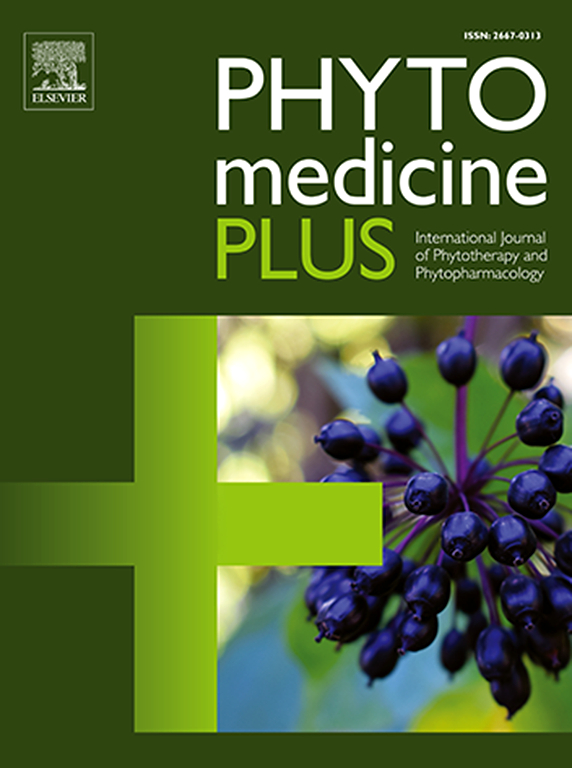ANGOCIN Anti-Infekt N in the treatment of urinary and respiratory tract infections: A pharmacy-based non-interventional observational study
Q3 Pharmacology, Toxicology and Pharmaceutics
引用次数: 0
Abstract
Background
Several studies have verified the efficacy and safety of a nasturtium and horseradish combination (ANGOCIN Anti-Infekt N, further referenced as ANGOCIN) for the treatment of acute respiratory and urinary tract infections.
Study design and purpose
This was a prospective pharmacy-based non-interventional cohort study to gain further insights into the use of ANGOCIN to treat respiratory (RTI) and urinary tract infections (UTI) under real-world conditions using a web-based patient survey (electronic patient reported outcome (ePRO)).
Methods
Participants were asked to register and take part in a patient survey when they purchased ANGOCIN at a German pharmacy. They were asked to answer the survey questions over a 14-day period.
Results
Participants (N = 479, mean age 41.5 ± 13.8 years) reported significant improvement of symptoms and subjective well-being under ANGOCIN treatment. For most participants (>60 %), the first symptom improvement occurred within the first two days of therapy, and the time to complete or sufficient symptom improvement was 12 days. This corresponds directly to the respective median duration of ANGOCIN intake (12 Days for RTI, 11 Days for UTI). Furthermore, almost all participants (96.5 %) were satisfied or even better with ANGOCIN treatment. Most of the participants (90.2 %) did not require additional antibiotics to treat their acute infection. The main reason for study discontinuation was the feeling of regaining health after ANGOCIN therapy (60 %); only a few participants terminated ANGOCIN therapy due to low tolerability (1.2 %). Most of the participants (96.5 %) stated that they intend to use ANGOCIN again for the next RTI or UTI, respectively.
Conclusions
These results are in line with results from other studies that herbal medications contribute to the recovery of infections. Furthermore, they reflect the S3-guideline statement that symptom-reducing herbal medications are a good alternative to antibiotics in treating uncomplicated acute and recurrent UTI. ANGOCIN is an effective and well-tolerated self-medication for RTI and UTI.

ANGOCIN抗感染N治疗泌尿和呼吸道感染:一项基于药物的非介入性观察研究
一些研究已经证实了旱金莲和辣根的组合(ANGOCIN Anti-Infekt N,进一步被称为ANGOCIN)治疗急性呼吸道和尿路感染的有效性和安全性。研究设计和目的这是一项前瞻性的基于药物的非介入队列研究,旨在通过基于网络的患者调查(电子患者报告结果(ePRO))进一步了解在现实条件下使用ANGOCIN治疗呼吸道(RTI)和尿路感染(UTI)。方法要求参与者在德国药店购买ANGOCIN时进行登记并参加患者调查。他们被要求在14天内回答调查问题。结果参与者(N = 479,平均年龄41.5±13.8岁)报告ANGOCIN治疗后症状和主观幸福感显著改善。对于大多数参与者(60%),第一次症状改善发生在治疗的前两天,完成或充分改善症状的时间为12天。这直接对应于各自ANGOCIN摄入的中位持续时间(RTI为12天,UTI为11天)。此外,几乎所有参与者(96.5%)对ANGOCIN治疗满意甚至更好。大多数参与者(90.2%)不需要额外的抗生素来治疗急性感染。中断研究的主要原因是ANGOCIN治疗后恢复健康的感觉(60%);只有少数受试者因耐受性低而终止ANGOCIN治疗(1.2%)。大多数参与者(96.5%)表示他们打算分别在下一次RTI或UTI中再次使用ANGOCIN。结论本研究结果与其他研究结果一致,即中药有助于感染的恢复。此外,它们反映了s3指南的声明,即减轻症状的草药是治疗非并发症急性和复发性尿路感染的良好替代抗生素。安哥辛是一种有效且耐受性良好的治疗尿路感染的自我药物。
本文章由计算机程序翻译,如有差异,请以英文原文为准。
求助全文
约1分钟内获得全文
求助全文
来源期刊

Phytomedicine Plus
Medicine-Complementary and Alternative Medicine
CiteScore
3.70
自引率
0.00%
发文量
178
审稿时长
81 days
期刊介绍:
 求助内容:
求助内容: 应助结果提醒方式:
应助结果提醒方式:


